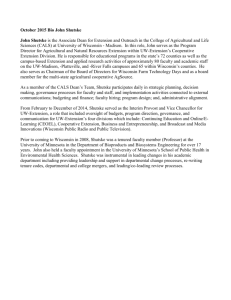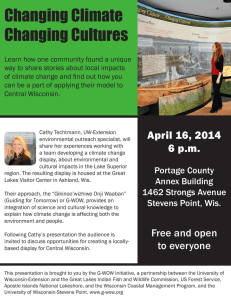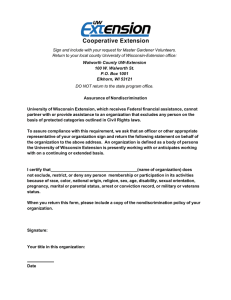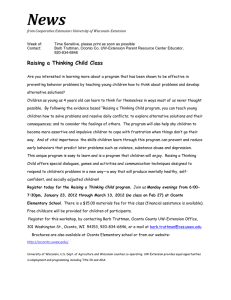UW-Extension Climate Ready Communities Initiative
advertisement
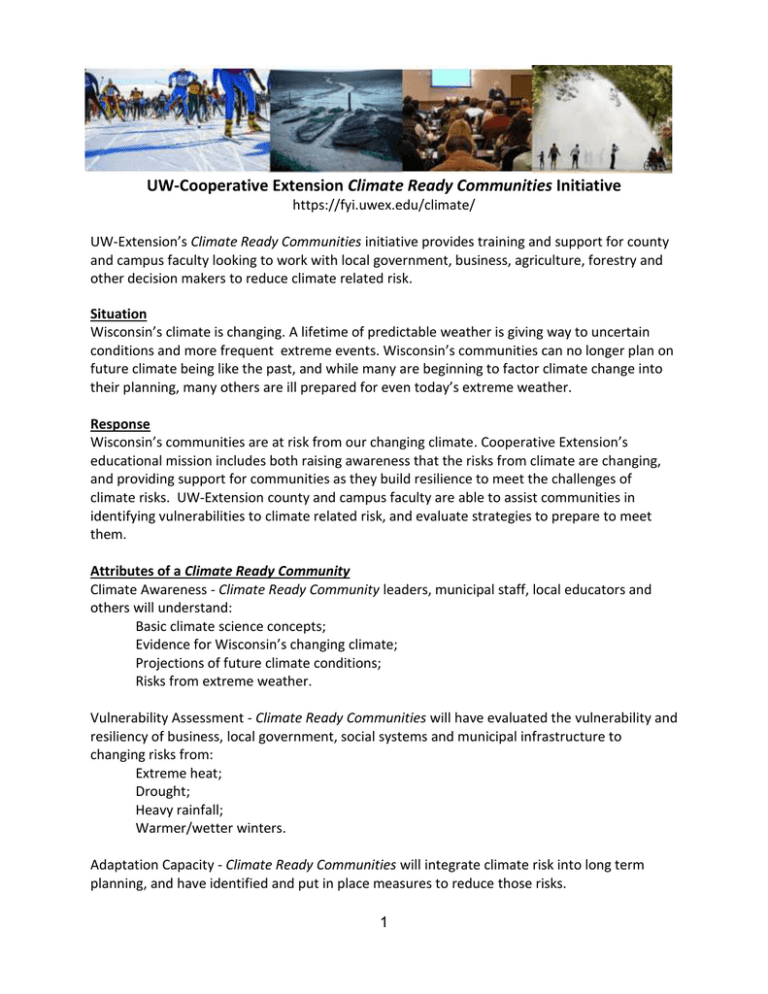
UW-Cooperative Extension Climate Ready Communities Initiative https://fyi.uwex.edu/climate/ UW-Extension’s Climate Ready Communities initiative provides training and support for county and campus faculty looking to work with local government, business, agriculture, forestry and other decision makers to reduce climate related risk. Situation Wisconsin’s climate is changing. A lifetime of predictable weather is giving way to uncertain conditions and more frequent extreme events. Wisconsin’s communities can no longer plan on future climate being like the past, and while many are beginning to factor climate change into their planning, many others are ill prepared for even today’s extreme weather. Response Wisconsin’s communities are at risk from our changing climate. Cooperative Extension’s educational mission includes both raising awareness that the risks from climate are changing, and providing support for communities as they build resilience to meet the challenges of climate risks. UW-Extension county and campus faculty are able to assist communities in identifying vulnerabilities to climate related risk, and evaluate strategies to prepare to meet them. Attributes of a Climate Ready Community Climate Awareness - Climate Ready Community leaders, municipal staff, local educators and others will understand: Basic climate science concepts; Evidence for Wisconsin’s changing climate; Projections of future climate conditions; Risks from extreme weather. Vulnerability Assessment - Climate Ready Communities will have evaluated the vulnerability and resiliency of business, local government, social systems and municipal infrastructure to changing risks from: Extreme heat; Drought; Heavy rainfall; Warmer/wetter winters. Adaptation Capacity - Climate Ready Communities will integrate climate risk into long term planning, and have identified and put in place measures to reduce those risks. 1 Stakeholders Unlike weather, changing climate is an effect that unfolds over long periods of time. However, as we understand how Wisconsin’s climate has already changed, we see opportunities to adapt to risk from today’s climate. Our stakeholders are found in roles where planning and management decisions related to public health and safety, and community development and the economy are common. Some examples include: Agriculture and forest industry; Economic development leaders; Emergency response coordinators; Land use planners; Municipal water and wastewater utility operators; Natural resource managers; Public health officials. The key to effectively engaging these stakeholders is to identify which climate risks and adaptation strategies are relevant to their management activities, and understand how climate adaptation can be integrated into their planning activities. Approach It is unlikely that outreach initiated explicitly to address climate change will be as successful as outreach which address that ongoing stakeholder management activities that are subject to increased climate risk. By integrating new information about climate risk and adaptation into ongoing planning we avoid potential pitfalls such as: Political or social controversy; Uncertainty in projected risk; Projections of a distant future; Thus, the UW-Extension Climate Ready Communities initiative is organized around opportunities that are representative of the types of educational outreach commonly provided by UW-Extension county faculty and statewide specialists: Agriculture and forest industry; Human health and safety; Local government planning; Natural resource management. For more information contact: David S. Liebl UW-Extension , Solid and Hazardous Waste Education Center Wisconsin Initiative on Climate Change Impacts 608-265-2360 david.liebl@ces.uwex.edu 2
